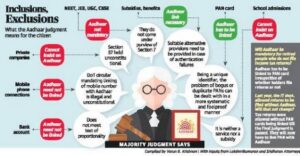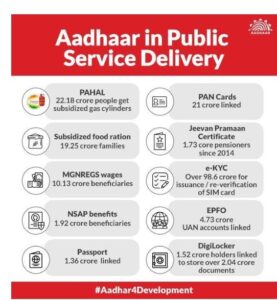Aadhaar unreliable in ‘hot, humid’ India: Moody’s
Relevance
- GS Paper 2: Government Policies & Interventions, GS Paper – 3, Cyber Security, Issues Arising Out of Design & Implementation of Policies.
- Tags: #Aadhaar,#Issues of Aadhar #moody’s #onetimepasscode #MGNREGA.
Why in the news?
Global rating major Moody’s Investors Service has flagged concerns about security and privacy vulnerabilities in centralized identification systems like India’s Aadhaar programme. The unique ID system often results in “service denials”, and using biometric technologies in humid conditions is unreliable.
Main Issue
The Aadhaar system enables access to public and private services, with verification via fingerprint or iris scans and alternatives like One-Time Passcodes (OTPs). However, it faces hurdles, including the burden of establishing authorization and concerns about biometric reliability.
What is Aadhaar?
- Aadhaar is a 12 digit individual identification number issued by the Unique Identification Authority of India on behalf of the Government of India.
- This number will serve as a proof of identity and address, anywhere in India. Aadhaar letter received via India Post and e-Aadhaardownloaded from UIDAI website are equally valid.
- Any individual, irrespective of age and gender, who is a resident in India and satisfies the verification process laid down by the UIDAI can enroll for Aadhaar.
- Each individual needs to enroll only once which is free of cost.
- Each Aadhaar number will be unique to an individual and will remainvalid for life. Aadhaar number will help you provide access to services like banking, mobile phone connections and other Govt and Non-Govt services in due course.
Aadhaar is-
- Easily verifiable in an online, cost-effective way
- Unique and robust enough to eliminate the large number of duplicate and fake identities in government and private databases
- A random number generated, devoid of any classification based on caste, creed, religion and geography.
Issues of Aadhar
Privacy, security concerns
- The rating agency termed Aadhaar, and a new crypto-based digital identity token called World line, as two digital ID systems in the world that stand out due to their scale and extent of innovation.
- However, Moody’s also said that they have “drawn scrutiny, especially concerning privacy and security”.
3% MGNREGS workers out of Aadhaar-based wage system
- Stressing that ID systems like Aadhaar lead to the concentration of sensitive information with specific entities and increase the risks of data breaches, Moody’s made a pitch for decentralized ID (DID)systems such as digital wallets, based on block-chain capabilities that give users more control of their private data and can reduce online fraud.
Issue of Centralised systems
- “In a centralized system, a single entity such as a bank,social media platform or government electoral roll controls and manages a user’s identifying credentials and their access to online resources.
- That entity can dispose of the user’s identity data – name, address and Social Security number, for example– for internal or third-party profiling purposes,” the report averred, stating that such systems offer the least personal data control to users.
Negative social repercussions
- At a broader level, it warned that digital IDs, centralized or not, can have negative social repercussions, since they may strengthen group identities and political divides, particularly if offered by technology and social media companies with significant monopolistic influence.
- “Consolidation of control within these entities could lead to a concentration of power over individual identities,shaping perceptions and interactions in the digital realm.
- Further “polarization of group identities and political affiliationswould undermine the goal of a united and diverse digital space,” it summed up.
Way Forward
Abide by the Supreme Court Ruling
The government must abide by and enforce Supreme Court directions, including
(1) restriction of mandatory Aadhaar to permissible purposes,
(2) provision of an alternative whenever Aadhaar authentication fails,
(3) unconditional exemption for children.
Ensure Benefits to Needy not Withdrawn
Benefits should never be withdrawn or suspended without
(1) advance disclosure of the names that are likely to be deleted along with reason for proposed deletion,
(2) issuing a show cause notice to those concerned and giving them an opportunity (with ample time) to respond or appeal,
(3) ex-post disclosure of all cases of deletion, with date and reason.
Stronger Safeguards Needed
The National Payments Corporation of India (NPCI) must urgently put in place stronger safeguards against the vulnerabilities of Aadhaar-enabled Payment Systems and better grievance redressal facilities.
Source: The Hindu.
Mains Question
Aadhaar that has revolutionized the governance delivery is not without problems. Elaborate.





